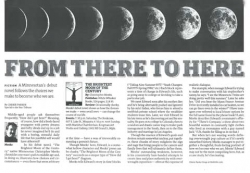
Advertising Age wrote last week, “Amid 23% population growth in the past two decades, U.S. newspaper circulation has dropped 20% –one reason your morning paper, downsized every which way, is no match for a stiff breeze. Craigslist, siphoning off $7 billion worth of classifieds, is another.”
I then read in the New York Times on Friday that the Times, which owns the Boston Globe, has threatened to close the Boston Globe unless the Globe can trim $20 million in its operating expenses. That’s because the Globe‘s advertising revenue is down 16.6 percent, with a circulation of 324,000.
This is just some of the talk about how newspapers are losing their market share and power, but from my own anecdotal evidence, it’s clear newspapers are far from dead, at least for book writers. When my short story collection, The Middle-Aged Man and the Sea, was reviewed in the Los Angeles Times a couple of years ago, sales bumped up a couple hundred immediately. That first book, by the way, was not returnable by bookstores (it is now) so few bookstores carried it. Most of those sales were through Amazon.com.
Since then, I’ve learned a few realities of the marketplace. This is in contrast to many of my friends who write books. They are hoping that a few good postings on the Internet will help sales at Amazon, and, voila, they’ll make lots of money and be able to write books for a living.
I have news: it doesn’t work that way. While Amazon sales are certainly something to shoot for (and I look my books’ rankings on Amazon far too often), online book sales are only 21% of all books sold, according to R.R. Bowker last year. Let’s say online gets up to one-third of all sales soon. That’s still two-thirds of books sold elsewhere, mostly bookstores.
Many people self-publishing, even if they focus on quality self-publishing, may be locking themselves out of the bookstore market if their books are not returnable and priced to bookstores with at least a 40% discount. Those are the two requirements to get into bookstores.
Even if your book matches those requirements–and perhaps published by a big publisher–that doesn’t mean bookstores will order your book. For instance, my novel, The Brightest Moon of the Century, came out last month. So far it’s received over a dozen great reviews from noted literary websites–but I’d found no chain stores had ordered the book after these postings. Amazon sales rose, though, which told me that people who read reviews online are likely to buy books online. Still, I wondered how do I get my books into the other two-thirds of the marketplace? I need my book in bookstores AND libraries.
Then along came one mixed review in a newspaper, the Minneapolis Star-Tribune, and five Barnes and Nobles in Minneapolis are suddenly carrying the book. That mixed review had a great graphic design as well as ending on a high note: “Meeks manages to put together a thoughtful, fresh-feeling portrait of how we become who we are. Meeks’s Edward may not be the most compelling hero, but, as a case study, he’s fascinating.” That review also brought some people to my reading in Wayzata, Minnesota.
Now I’m wishing for reviews in more newspapers. While newspaper reviews still carry a hell of a lot of weight, try to get the attention of an editor. I’m not holding my breath.
That’s because I reviewed books for two different newspapers years ago, and the biggest thing I remember is how many books those newspapers received for review–hundreds per week. I’d be allowed to walk into a giant closet where books from the past six weeks were kept. Most were on shelves, but that day’s offerings were still on the floor, a vast pool of brown boxes. “Chose one,” the editor would say, and I’d look at the several hundred and think of the poor authors who would not get reviewed.
Now I’m on the other end. My present publicist has sent my book to thirty-some newspapers because that’s what publicists do, send books to reviewers in hopes some critic, as I had been, will find it. Publicists also call editors to remind them, but I’d heard Los Angeles Times book editor David Ulin on a panel say he never takes calls from publicists, and he rarely reads his email.
When I reviewed books was also before newspapers had lost circulation and advertising, and the space devoted to book reviews shrunk immensely. “You’re absolutely right that reviews in old-fashioned newspapers still have a place,” says Rebecca of the Book Lady’s Blog, who works at a bookstore in Richmond, Virginia. “I’d say we have several dozen customers come in each week to show us a review in the paper and ask if we have the book, and that always makes me happy. I love what blogging and the internet have done for publicity and communication, but I hate to see print newspapers dying out, and I hope readers will continue to turn to them for recommendations.”
To get into a newspaper now, you seem to have to be T.C. Boyle or Joyce Carol Oates, who publish often and are recognized. Still, if you’re a new novelist like myself, you’re hammering on the bookstores’ windows, “Hello, I’m here,” but you aren’t yet seen.
No one said this business was easy.
Get an Editorial Review | Get Amazon Sales & Reviews | Get Edited | Get Beta Readers | Enter the SPR Book Awards | Other Marketing Services






















>>>Many people self-publishing, even if they focus on quality self-publishing, may be locking themselves out of the bookstore market
Huh. A “bookstore market” that will resemble this in five years or so:
http://mikecane.wordpress.com/2007/04/06/photo-album-whats-become-of-tower-records/
Come on, how many people still go to a “record store” for music?